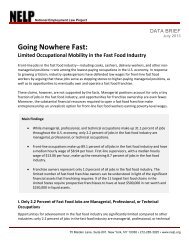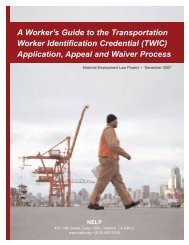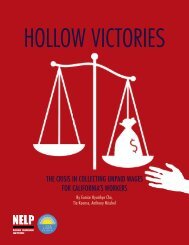Rebuilding Lives. Strengthening Communities.
Rebuilding Lives. Strengthening Communities.
Rebuilding Lives. Strengthening Communities.
You also want an ePaper? Increase the reach of your titles
YUMPU automatically turns print PDFs into web optimized ePapers that Google loves.
Issue<br />
Develop more community-based employment centers that use a<br />
comprehensive approach and provide long-term support.<br />
Recommendation<br />
In some Chicago neighborhoods, community-based<br />
education and employment agencies have helped formerly<br />
incarcerated individuals find work for many years.<br />
They have developed sophisticated, comprehensive<br />
strategies for serving this population, and they have<br />
tapped into private and public funding streams to support<br />
the necessary array of services. In these communities, a<br />
person leaving prison will usually hear by word of mouth<br />
that a certain neighborhood organization is “the place to<br />
go” for formerly incarcerated individuals seeking a job.<br />
MAYORAL POLICY CAUCUS ON PRISONER REENTRY<br />
28<br />
However, there are not enough such agencies in Chicago.<br />
Those that do exist do not always have the capacity to<br />
meet the need in their communities, and many communitybased<br />
agencies, although employment-focused, do not<br />
have experience serving formerly incarcerated individuals.<br />
Chicago is home to five One-Stop Career Centers, also<br />
known as Chicago Workforce Centers, which provide<br />
employment and employment-related services to lowincome<br />
individuals. But because of the specific federal<br />
funding source for these centers (usually Workforce<br />
Investment Act funds), there are placement and retention<br />
benchmarks, program constraints and eligibility<br />
requirements which do not always make the Chicago<br />
Workforce Centers effective for former prisoners.<br />
Formerly incarcerated individuals, by virtue of their substance<br />
abuse histories, emotional, mental and physical<br />
health challenges, academic deficiencies, or limited<br />
employment experience, often need access to a variety of<br />
services over a long period of time. Further, family issues<br />
frequently are intertwined with prisoners’ issues as they<br />
reenter society and must be addressed concurrently. The<br />
Chicago Workforce Centers, by and large, have not provided<br />
an environment conducive for former prisoners to<br />
discuss these issues and do not have resources to<br />
sufficiently handle them. 79<br />
Similarly, many traditional community-based education<br />
and employment agencies are not adequately equipped to<br />
assist individuals with criminal records in finding gainful,<br />
long-term employment. These agencies’ services also may<br />
contain funding limitations, programmatic constraints or<br />
eligibility requirements that prevent them from serving<br />
formerly incarcerated individuals. For example, some<br />
agencies provide technical training as part of job preparation<br />
that requires participants to read and compute at a<br />
ninth-grade level. Many former prisoners cannot meet<br />
this requirement, and consequently may not benefit from<br />
these agencies’ services and programs.<br />
These agencies must do more than assist released<br />
prisoners in obtaining skills and connecting with employers.<br />
Formerly incarcerated individuals present complicated,<br />
multi-layered barriers to employment. Agencies serving<br />
these individuals need to address changes in attitudes,<br />
behaviors and lifestyle from prison culture and criminal<br />
activity and encourage positive engagement in the community.<br />
These agencies must do more than teach<br />
marketable skills; they must help reestablish connections.<br />
Moreover, low-wage, unskilled workers will often cycle<br />
through several different jobs. 80 The first job placement<br />
often is the beginning of a long progression, which may be<br />
disrupted as former prisoners struggle to meet demands of<br />
the workplace along with emotional and practical adjustments<br />
of life outside prison. 81 Organizations that address<br />
only employment will not successfully meet the needs of<br />
these individuals. A more comprehensive, long-term<br />
approach integrating supportive services is necessary.
















